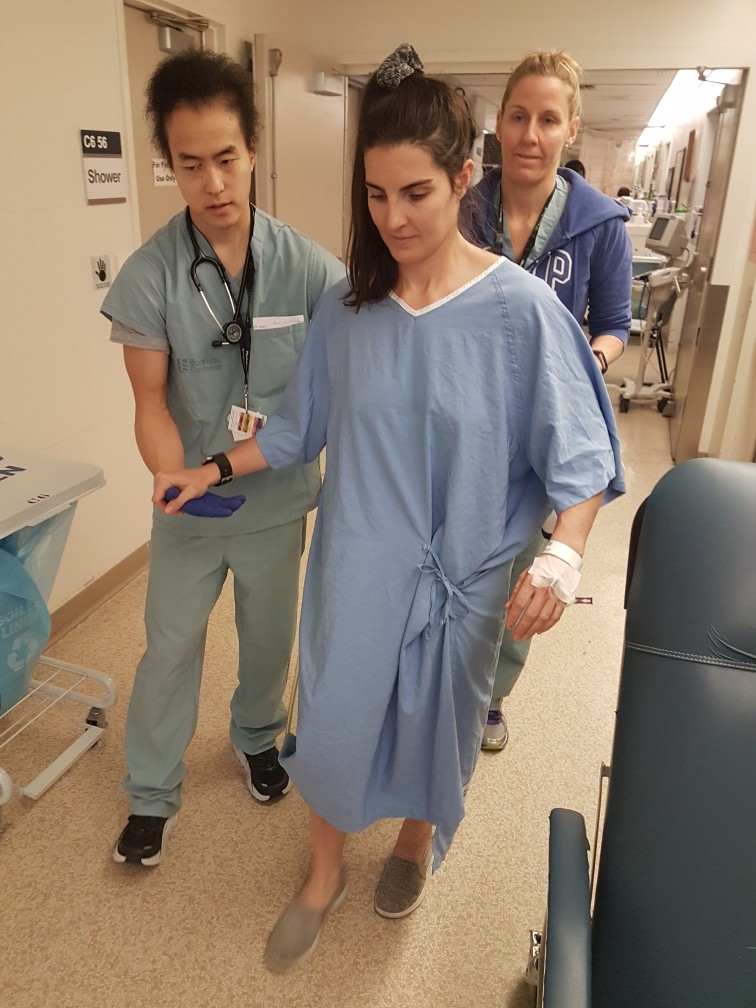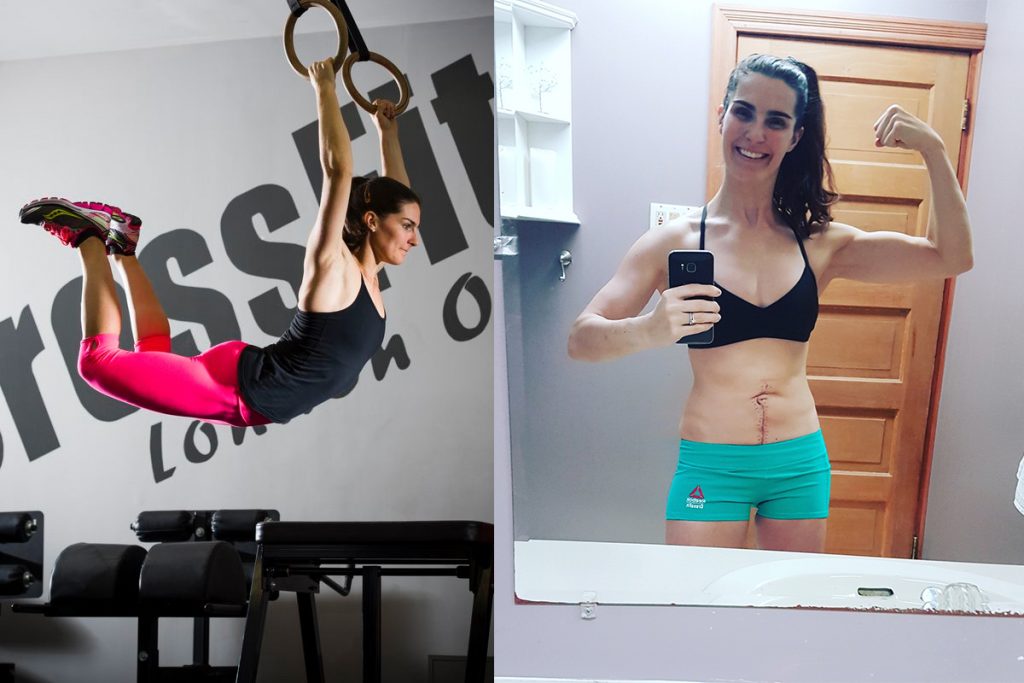Living and Training with Ovarian Cancer: “Believe the Diagnosis, not the Prognosis”
In October 2018, Jennifer Broxterman received a phone call from a blocked number. A gastrointestinal surgeon was on the line to tell her she had colon cancer.
“I remember it so clearly — so cold, clinical, straight to the point,” said Broxterman, a 2013 and 2014 Canada East regional competitor from London, Ontario.
Turns out, her doctor was wrong. Broxterman’s eventual diagnosis was a whole lot more dire than that.
Upon further investigation, it was determined the primary source was ovarian cancer, which had spread to her colon. In fact, they eventually discovered two types of ovarian cancer, a slower-growing one and a particularly deadly, rapidly-growing one.
The prognosis: A five-year survival rate of nine percent.
So according to statistics, the 35-year-old Registered Dietitian, whose husband Dave Henry owns CrossFit London, has a nine percent chance of living for five years.
From Diagnosis to Surgery to Rehab
In December 2019, Broxterman underwent major surgery, where doctors discovered her Stage 3 cancer had spread more than originally thought. As a result, she lost her entire reproductive tract, two parts of her large intestine, a part of her small intestine, her appendix, ileocecal valve and part of her bladder.
To say 2019 was a horrible nightmare is an understatement.
But somehow, through the nightmare, Broxterman has found a way to remain hopeful, positive and legitimately happy.
“I actually don’t have any less happiness in my life today than I did before the diagnosis,” she said. “The lows are deeper and the fears and anxieties I feel are stronger than ever, but I come out of those moments with so much appreciation and gratitude and love for all of the things that are still really good in my life.”
Broxterman is adamant she never would have been able to embrace this mindset if it weren’t for CrossFit — and the fitness it has helped her achieve in the last 12 years — and for her community of friends at CrossFit London.
She remembers her first workout back, a couple weeks after she was released from the hospital. Her femoral nerve had been damaged during surgery, which left her temporarily paralyzed and then unable to walk. Only weeks before, she had been back squatting more than 200 pounds and rocking muscle-ups. And now, just walking with a walker was hard.
“I literally just walked one circle around the gym — that was the whole workout — but it was the most amazing walk ever. I had an entire group of people, and my dog, beside me cheering me on,” she said.
She added: “You really just can’t put a price on the emotional support I have received from the community.”

Also because of CrossFit, doctors felt comfortable releasing Broxterman from the hospital earlier than they would have had she not been so fit and strong, and had she not had a husband who was competent in helping her rehabilitate her body.
Broxterman credits her high fitness level leading up to her surgery with making this last year — the worst year of her life — much more bearable than it otherwise would have been.
“Just things like how I had the upper body strength to pull myself out of bed in the hospital when my abs had been cut open and my legs didn’t work,” she said. “Or how I could hold and support myself to sit on a toilet.”
Her 12 years of CrossFit, including competing at the regional level, also made her much more resilient to coping with physical pain, she explained.
“The pain was a 15 out of 10 after surgery,” she said. To get through the pain, she trained herself to focus on getting through just one minute at a time.
“It was kind of like the worst WOD of your life, where you have to dig deeper and you think, ‘OK, three more reps. Just three more reps.’ And then you do those three reps and then you’re like, ‘Shit, another three reps,’” she said.
Broxterman added: “Because of CrossFit, I knew the pain was temporary, that I would get through it. I was way more mentally resilient because of it.”
While CrossFit has been her number one secret weapon, her second secret weapon is her depth of knowledge about human biology and nutrition, which she studied in university for nine years before opening her own company, NutritionRx, and becoming a Foods and Nutrition instructor at Western University in London.
This knowledge has allowed her, not only to fuel her body with the right foods to fight cancer, but also to take her health in her own hands, especially when the medical system gets complacent.
For example, Broxterman was the one who brought the idea up to her oncologist about taking a medication called Letrozole. She knew her type of cancer was an estrogen positive cancer, meaning cancer cells grow in the presence of estrogen. Letrozole essentially blocks estrogen receptors, thus decreasing the chance of cancer cell growth. According to research, Letrozole increases the five-year survival rate from nine percent to 30 percent.
Had Broxterman not had the knowledge she did, she never would have been introduced to Letrozole, she explained. And although the side effects include hot flashes, fatigue and decreased bone density, the choice was simple: Take Letrozole.
Despite her generally positive attitude, Broxterman also isn’t afraid to be vulnerable and real in her dark moments. She isn’t afraid to break down, and in fact opening up about her pain has been therapeutic, she explained.
On November 18, 2019, Broxterman shared these thoughts on social media:
“I feel worried. Nine percent is the five-year survival rate. Nine percent, nine percent, nine percent (obsess, obsess, obsess). What if it comes back? What if I get sick again and go down quickly?”
“I don’t want Dave to be a widower, and I don’t want to leave him behind so young.”
“We are supposed to grow old together.”
“My heart breaks every time I think about that.”
“Sadness. My heart is just so sad.”

Learning to Control What She Can
Six months after surgery, Broxterman decided to pay CA$3,000 out of pocket for a positron emission tomography (PET) scan to see if her cancer was growing back.
“My oncologist told me not to bother because there was a 99.9 percent chance the cancer would have already started to grow back,” she said.
But she wanted to know. She needed to know. She wasn’t prepared to roll over just because the prognosis was grim.
Against all odds, her PET scan results showed no evidence of disease (NED). While technically her cancer isn’t ever considered to be in remission, if there’s a NED for five years, she will be able to call herself cancer-free.
If nothing else, her clear PET scan gave Broxterman a reason to believe she can beat the odds.
“I have said from the beginning, ‘Believe the diagnosis, but not necessarily the prognosis,’” she said.
Thus, she’s choosing not to believe the statistics and will actively continue to do everything she possibly can through a healthy diet and exercise, sleep, reducing stress levels, and surrounding herself with a supportive community of family and friends at CrossFit London who bring her happiness. She is choosing to believe radical remission is possible.
Because, what’s the point in not believing?
“I made a conscious choice two days before surgery, and I wrote down all the words I want to come out of me: joy, love, happiness, positivity. I have been very intentional about how I want to come out of this. I may or may not die of cancer, but I can’t control that. What I can control is how I face it, and I’m going to face it courageously, with positivity,” she said.
Broxterman added: “And the science part of my brain knows that whatever you visualize, your body reacts to. So I actively visualized white blood cells attacking my cancer. And when I get anxious, I remind myself that the worst case scenario isn’t my reality right now, so I refuse to put energy into worrying about that right now.”
Right now, Broxterman is living her normal life. She runs her nutrition business. She works out at CrossFit London six days a week. She spends time with her family and friends, and she does her best not to let cancer get her down.
“I don’t feel like a sick person. I feel like a happy, strong, badass Jen,” said Broxterman, now 14 months post-surgery. “Except when I have hot flashes and have to whip my shirt off and stand outside in a sports bra in the freezing cold Canadian winter to cool off. Props to all the menopausal women training through a hot flash,”she joked.
In fact, today, Broxterman’s back squat is only 10 lb. or so off her all-time max, and she’s back crushing pull-ups and muscle-ups.
Her motto is an old school CrossFit one coined by Coach Mark Rippetoe: “Stronger people are harder to kill. Dave and I joke about that all the time,” she laughed.
Broxterman added: “When I’m at CrossFit, I feel so alive, so strong, so resilient. CrossFit is medicine. It really is.”
A GoFundMe campaign raised CA$20,000 for Broxterman in the weeks following her surgery, but she still has a ton of ongoing expenses, including frequent travel to Toronto for appointments, time off work, yearly PET scans etc—meaning she’s constantly paying out of pocket to keep herself healthy. If you’re interested in helping, head to Jen’s Fight Gone Right GoFundMe.